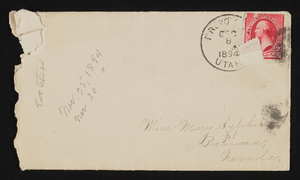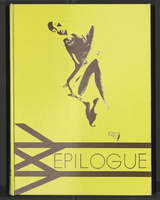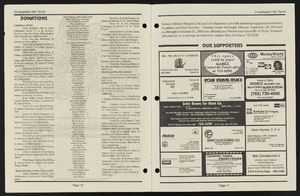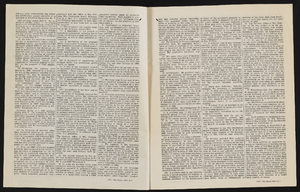Search the Special Collections and Archives Portal
Search Results

Letter and envelope from Annie Ronnow, Provo, Utah. to Mary Etta Syphus, Panaca, Nevada
Date
Archival Collection
Description
From the Syphus-Bunker Papers (MS-00169). The folder contains an original handwritten letter, an envelope, a typed transcription of the same letter, and a copy of original letter attached.
Text

Epilogue: UNLV Yearbook, 1972
Date
Description
Yearbook main highlights: schools and departments; detailed lists with names and headshots of faculty, administration and students; variety of photos from activities, festivals, campus life, and buildings; campus organizations such as sororities, fraternities and councils; beauty contest winners; college sports and featured athletes; and printed advertisements of local businesses; Institution name: University of Nevada, Las Vegas
Mixed Content

Transcript of interview with Patsy Rosenberry by Barbara Tabach, February 24, 2013
Date
Archival Collection
Description
In the early summer of 1972, Patsy and Chuck Rosenberry packed the car to begin their journey from Hattiesburg, Mississippi to Las Vegas. Patsy’s two teenage children (plus a friend) crowded into the back seat as Chuck eased behind the wheel. He and Patsy had just recently married and he was taking his new family to their new home in southern Nevada. Chuck was a nuclear technologist at the Nevada Test Site and a kind, patient man that Patsy would have followed anywhere. As it turned out, Las Vegas was a wonderful fit and the family would thrive in their new hometown of Las Vegas. The children attended Valley High School; the family eventually bought into a house in the Paradise Valley area; and from 1978 to 1999 Patsy enjoyed working with a growing cardiovascular group. Chuck censored his work-talk like most Test Site employees, but Patsy recalls with pride his concern for safety and how he always felt the public did not have correct information. She also remembers the fun of partic
Text

Francisco Rufino Parra interview, December 6, 2018: transcript
Date
Archival Collection
Description
Interviewed by Barbara Tabach. Born in Mexico, Francisco was a child when his father received permission to immigrate to the US with his younger children. Upon graduating from high school in California, he moved to Las Vegas where one of his sisters lived. It was 1994 and jobs were plentiful; he would find his way through several positions. Then in early 2000 he was hired to be a dishwasher, on the graveyard, at the recently opened Paris Hotel. It was a Culinary Union job; by 2002 he was a shop steward and finding better positions at Paris. He continues to work at the Paris Hotel as a fry cook. In 2008, he was a citizen and proudly voted in his first presidential election.
Text

Ricardo Torres-Cortez interview, May 7, 2019: transcript
Date
Archival Collection
Description
Interviewed by Barbara Tabach. Monserrath Hernández and Maribel Estrada Calderón also participate in the questioning. Born in Mexico, came to live in Las Vegas in 1985. Graduate of UNLV in Journalism and a reporter of Public Safety for the Las Vegas Sun. Ricardo covered the 1 October shooting, the killing of two police officers and other traumatic news of the community.
Text

Transcript of interview with Marion Brooks by Kathleen Kasmir, February 24, 1975
Date
Archival Collection
Description
On February 24, 1975, Kathleen Kasmir interviewed Marion Brooks (born 1913 in Santa Ana, California) about his life in Southern Nevada and his work as a mining engineer. Brooks first talks about his background before talking extensively about his early work in mining. Brooks also mentions some of the professional mining societies of which he was a part, and the two then move on to discuss gambling, recreational activities, and the atomic testing. Other topics covered during the interview include the price of groceries and food, the El Rancho Vegas, social changes, population growth, and environmental changes. The end of the interview then shifts back to Brooks’ work in mining at Blue Diamond and then a discussion on the possible locations of three lost mines.
Text

Transcript of interview with Clark Crocker by Monica Lehman, March 3, 1978
Date
Archival Collection
Description
On March 3, 1978, Monica Lehman interviewed Clark Crocker (born 1920 in Westfield, Massachusetts) about his experiences while living in Nevada. Crocker first talks about his family and educational background before describing his experiences from going to school in both California and Massachusetts. Crocker then describes what he knows about the building of Hoover Dam and later talks about his career as a teacher and school principal. The two also discuss Crocker’s hobbies and volunteer work, including that for the fire department in Pahrump, and they later discuss Crocker’s experiences as both a frogman and navigator for the United States Navy during World War II. The interview concludes with some of Crocker’s thoughts and philosophies on how curriculum should be structured in schools.
Text

Transcript of interview with Laura Sussman and Wendy Kraft by Barbara Tabach, February 17, 2016
Date
Archival Collection
Description
They've been referred to as the two Jewish mothers who own a funeral home. At first glance that seems too simple a description. However, it is how they arrived at this description that tells a story of two women who moved here in the late 1990s and whose paths crossed as they became part of the Jewish community of Las Vegas. Laura Sussman arrived first. It was 1997. The Jewish Community Center, a JCC without walls as Laura puts it, hired her as its first executive director. She was from Ohio where there was a robust Jewish tradition. She was director for eight years; then executive director at Temple Beth Sholom. Wendy Kraft moved to the valley in 1999. She was a stay at home mom from Boston, who was accustom to volunteering in the Jewish community. Knowing no one and on the brink of divorce, the Jewish community became her life, a way to build a network of friends and keep her occupied just as it had been in Boston. The two women met through their work with the JCC and love followed. Several years later, in 2009, so did their new business, Kraft-Sussman Funeral and Cremation services. By February 6, 2015, Laura and Wendy had married. They had already formed a family with each other and their three daughters, Leah Sussman, Emma and Elyse Kraft. In this interview they discuss their joint sense of purpose that includes love of family, dedication to the Jewish community, pride in the LGBT identity, and providing caring services to those at the time of funeral services. They talk also of Jewish traditions related to death, the Jewish burial society known as Chevra Kadisha, and challenges of their industry. They share feelings about nonprofits and how they value being actively involved in the community.
Text


